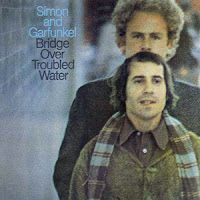Bridge Over Troubled Water
 Forty years ago today the number one album in the U.S. was Simon and Garfunkel's Bridge Over Trouble Water. It would have a ten-week run on the top. In the U.K., it would spend an incredible 33 weeks at the top of the charts. It won six Grammy awards, including album of the year. I have a boxed set of all five of the duo's albums, and have listened to it repeatedly for the past few days. It holds up marvelously.
Forty years ago today the number one album in the U.S. was Simon and Garfunkel's Bridge Over Trouble Water. It would have a ten-week run on the top. In the U.K., it would spend an incredible 33 weeks at the top of the charts. It won six Grammy awards, including album of the year. I have a boxed set of all five of the duo's albums, and have listened to it repeatedly for the past few days. It holds up marvelously.This would be the last Simon and Garfunkel album, and the theme of separation runs throughout it. It's easy to read too much into it, and listen for clues to the two's relationship in every song--for example, with "So Long, Frank Lloyd Wright," in which Garfunkel sings, "I can't believe your song is gone so soon, I barely learned the tune," or "The Only Living Boy in New York," which Simon wrote while Garfunkel was off shooting a movie, and sings, "Tom, get your plane right on time. I know you've been eager to fly now."
The pair certainly had a complicated relationship. Simon, in many respects, didn't need Garfunkel, artistically speaking. Simon was the musical genius, Garfunkel had the heavenly voice with which he could harmonize, and Simon's solo career hasn't missed a beat. But one has to wonder whether, as they were breaking up, the pull of nostalgia wasn't there, remembering when they were known as Tom and Jerry and copying the Everly Brothers (a cover version of "Bye Bye Love" is on this record). Years later Simon would make an album called Hearts and Bones, which he recorded with Garfunkel, but then removed all of Artie's vocals before the album was finished. Very complicated.
The album kicks off with the title song, one that has been become iconic. It's pleasant to think of Simon first coming up with the tune on the piano (or guitar, but I prefer imagining the piano, as this is how it opens) and wondering to himself, "I think I have something here." It's Garfunkel's crowning achievement as a vocalist, so it's odd to read that Simon regrets not singing it, and Garfunkel didn't want to sing it. It's hard to imagine this song without Garfunkel's ethereally beautiful vocal (of course Simon has sung it in concert, and it doesn't sound right). The lyric is a simple declaration of unwavering support, and when the last verse, along with the strings and Simon's harmony, kicks in--"Sail on silver girl, sail on by, your time has come to shine, all your dreams are on their way"--bliss. Even after repeated listens the song never sounds too treacly or bombastic to me. It has a lush production, a novelty in the age of hard rock, but pushes the limits without exceeding them.
As Garfunkel hits the high note and the song ends with a bang, it fades into "El Condor Pasa," an old Peruvian song that Simon updated with a Zen quality: "I'd rather be a hammer than a nail," etc. The Andean instruments backing him were something of a first on a pop record, and gave it an exotic sound that still entrances today. Years ago I was at a shopping plaza and heard an Andean musician playing a pan flute and immediately thought of this song.
The hits keep coming with "Cecilia," a hard-rocking comic song that includes the memorable lines, "Making love in the afternoon with Cecilia, up in my bedroom. I got up to wash my face, when I come back to bed someone's taken my place."
Side two (when there were sides to records) has a masterpiece of its own, "The Boxer." I've never quite been sure what it's about. It has the structure of the opening of a bildungsroman, with a young man singing about his humble roots, and ends with a metaphor of a pugilist. It has the sense of being profound, but perhaps there's nothing to be found there. In any event, it is brilliant produced, and the haunting chorus of "li-la-li" lingers in the mind. Simon admitted that he chose those syllables because he couldn't think of any words to go there.
The album also contains a pair of fun and foot-tapping rock numbers, "Keep the Customer Satisfied" and "Baby Driver." The only song I don't really care for is "You Never Write Me," which, in comparison with everything else on the album, seems like a throw-away.
Of the five albums the pair made, this one is right up there with Bookends as their greatest. The latter was perhaps a greater accomplishment as a themed collection of songs, but Bridge Over Troubled Water is probably their grander achievement, as it contains Simon's best writing, Garfunkel's best vocals, and the four hit singles.


Comments
Post a Comment